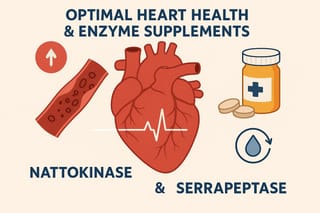Introduction
Cold exposure—through practices like cold plunges, showers, and winter swimming—has captured attention for its potential cardiovascular benefits. Touted for improving heart health, metabolism, heart rate variability (HRV), and brown adipose tissue (BAT) activation, these protocols are often discussed as tools for achieving an optimal heart. As interest surges, understanding both the potential and the cautions is vital for anyone seeking optimum cardiovascular outcomes. This article will explore how different cold exposure modalities can influence heart health, highlight evidence-based benefits and risks, and offer actionable guidelines for integration.
What is Cold Exposure?
Cold exposure refers to the intentional submersion or exposure of the body to cold water or air, often through cold plunges, showers, or outdoor swimming, typically at temperatures below 15°C (59°F). Originating in cultural traditions like Nordic winter bathing, it’s now widely practiced as a biohacking or wellness protocol. Cold exposure activates physiological responses—shivering, increased metabolism, vascular constriction, and stimulation of brown adipose tissue—all of which may impact cardiovascular health and support an optimal heart (Ivanov, 2018) (Tipton, 2017).
Benefits and Outcomes in Heart Disease
Evidence suggests that moderate, controlled cold exposure can positively affect heart health. Cold plunges may improve HRV, an important marker of cardiac autonomic function, indicating resilience and lower risk for adverse cardiac events (Stanley et al., 2012). Regular cold water immersion has been linked to enhanced activation of brown adipose tissue, which increases calorie burning and may aid in weight management—another factor for an optimal heart (van der Lans et al., 2013). Additionally, cold exposure can prompt vasoconstriction and, with repeated exposure, vascular adaptation, potentially lowering blood pressure over time (Tipton et al., 2017). However, benefit varies widely based on protocol, individual health status, and frequency.
Research Insights
A growing body of research evaluates cold exposure’s impact on the cardiovascular system. Systematic reviews report improvements in HRV and cardiovascular efficiency in healthy adults after controlled cold immersion, though results vary with age and pre-existing conditions (Hunt et al., 2015). A 2018 review emphasized the role of regular cold exposure in stimulating brown adipose tissue, thereby supporting metabolic health and possibly reducing cardiovascular risk factors (Ivanov, 2018). Notably, the greatest benefits appear in individuals who gradually adapt to cold, suggesting protocol customization is key to achieving an optimal heart.
Practical Applications
Integrating cold exposure to support heart health and an optimal heart can include:
- Cold Showers: Start with 30–60 seconds of cold water at the end of a shower; gradually increase as tolerated (Stanley et al., 2012).
- Cold Plunges: Safety-first immersion in water between 10°C to 15°C for 1–3 minutes, never alone and under supervision if at risk for heart disease (Tipton, 2017).
- Winter Swimming: Appropriate only for healthy, acclimated individuals; not recommended for those with arrhythmias or uncontrolled hypertension.
- Best Candidates: Healthy adults, those with metabolic syndrome (under guidance), and athletes benefit most (Ivanov, 2018).
Risks & Limitations
While cold exposure has clear potential for heart health and achieving an optimal heart, there are risks. Individuals with underlying heart disease, arrhythmias, or uncontrolled high blood pressure should consult a health professional first, as acute cold stress can trigger arrhythmias or adverse cardiac events (Tipton et al., 2017). Some studies report variability in benefits, with inconsistent or minimal effects in older adults and those with chronic disease (Hunt et al., 2015). Overall, research is promising but requires further large-scale, long-term trials.
Key Takeaways
- Moderate, controlled cold exposure may improve heart health markers like HRV and metabolic function.
- Activation of brown adipose tissue during cold exposure supports calorie burning and cardiovascular risk reduction—factors in attaining an optimal heart.
- Protocol safety and individual adaptation are critical to maximize benefits and avoid risks.
- Not all populations benefit equally; high-risk individuals should seek medical advice first.
- More research is needed to establish standardized protocols for cardiovascular benefits.
Frequently Asked Questions
1. Can cold exposure lower my risk of heart disease?Controlled studies suggest cold exposure can improve HRV and metabolic markers linked to heart disease risk, but more research is needed (Ivanov, 2018).
2. Who should avoid cold plunges or winter swimming?
People with uncontrolled hypertension, arrhythmia, or heart disease should consult a doctor due to increased cardiac risk (Tipton et al., 2017).
3. How does cold exposure increase heart rate variability (HRV)?
Cold exposure activates the autonomic nervous system, promoting parasympathetic tone and potentially increasing HRV (Stanley et al., 2012).
4. What is the safest way to start cold exposure for heart health?
Begin with brief, moderate cold showers, gradually increasing time while monitoring for any adverse symptoms. Always seek professional guidance if you have heart risk factors (Hunt et al., 2015).
Suggested Links
Conclusion
Cold exposure is an intriguing, emerging strategy with the potential to enhance heart health and support an optimal heart. While early research highlights promising benefits in HRV, metabolism, and brown fat activation, safety and personalization are paramount—especially for those with pre-existing cardiovascular risk. By approaching cold exposure thoughtfully, individuals may complement other heart-healthy habits in pursuit of optimal cardiovascular outcomes. Always discuss new protocols with a healthcare provider to ensure they are right for your heart health journey.
References
Ivanov, K. P., 2018. Cold adaptation and cardiovascular health: A review. Frontiers in Physiology. https://www.ncbi.nlm.nih.gov/pmc/articles/PMC5868931/Tipton, M., 2017. The physiology of cold exposure and cardiovascular risks. Experimental Physiology. https://pubmed.ncbi.nlm.nih.gov/28562558/Stanley, J., Peake, J. M., & Buchheit, M., 2012. Cardiac parasympathetic reactivation following exercise: implications for cold water immersion. Journal of Sports Sciences. https://pubmed.ncbi.nlm.nih.gov/22381296/Hunt, J., et al., 2015. Cardiovascular responses to cold exposure in humans: A systematic review. European Journal of Applied Physiology. https://pubmed.ncbi.nlm.nih.gov/25742293/van der Lans, A.A.J.J., et al., 2013. Cold acclimation recruits human brown fat and increases nonshivering thermogenesis. Journal of Clinical Investigation. https://pubmed.ncbi.nlm.nih.gov/23603815/





